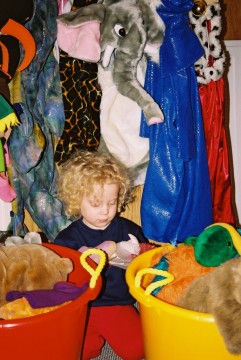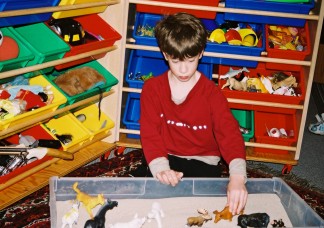Play therapy refers to a
variety of approaches used by child psychologists and other child therapists
in which the therapy includes both talking and play, a natural medium of
expression for children. Play therapy is not simply play, any more than
adult psychotherapy is simply talking, but rather this method encourages
the child to explore his or her feelings and experience in a supportive
environment.  Emotions
are often difficult to understand for children and even more difficult
to express. Play provides a non-threatening way for children to express
themselves. Play allows children a safe psychological distance from their
problems and allows them to express their true thoughts and feelings in
ways best suited to their developmental level. This is particularly important
when children are trying to come to terms with trauma, such as physical
abuse, sexual abuse, or the loss of an important relationship through death
or divorce. It is also an important aspect of therapy for children who
are displaying "difficult behaviour" such as aggression or being oppositional,
since these children are usually struggling with difficulties in expressing
their feelings in appropriate ways. Along with play, I may also use other
methods to help children experience and express their feelings more constructively.
Virtually all children that I work with like coming to see me, so parents
are not faced with a struggle getting their child to therapy.
Emotions
are often difficult to understand for children and even more difficult
to express. Play provides a non-threatening way for children to express
themselves. Play allows children a safe psychological distance from their
problems and allows them to express their true thoughts and feelings in
ways best suited to their developmental level. This is particularly important
when children are trying to come to terms with trauma, such as physical
abuse, sexual abuse, or the loss of an important relationship through death
or divorce. It is also an important aspect of therapy for children who
are displaying "difficult behaviour" such as aggression or being oppositional,
since these children are usually struggling with difficulties in expressing
their feelings in appropriate ways. Along with play, I may also use other
methods to help children experience and express their feelings more constructively.
Virtually all children that I work with like coming to see me, so parents
are not faced with a struggle getting their child to therapy.
As with adults, an important
aspect of experiencing safety in therapy is confidentiality. Confidentiality
allows children to feel that they can fully express themselves without
being inhibited by the concern over their parents' reactions or feelings.  Therefore,
like most play therapists, I do not tell other people what children specifically
say and do in play therapy (except in cases of allegations of abuse or
a high risk of harm to self or others). I involve parents by sharing general
themes in their child's therapy, talking about their progress, and discussing
my conclusions about their child. When I work with children in play
therapy I prefer to meet with the parent(s) on a regular basis and during
this time we also typically discuss ways of responding to their child that
will be most helpful. Family therapy, involving all family members living
with the child, can also be a useful approach to use together with play
therapy (See the link to the left).
Therefore,
like most play therapists, I do not tell other people what children specifically
say and do in play therapy (except in cases of allegations of abuse or
a high risk of harm to self or others). I involve parents by sharing general
themes in their child's therapy, talking about their progress, and discussing
my conclusions about their child. When I work with children in play
therapy I prefer to meet with the parent(s) on a regular basis and during
this time we also typically discuss ways of responding to their child that
will be most helpful. Family therapy, involving all family members living
with the child, can also be a useful approach to use together with play
therapy (See the link to the left).
When parents are willing,
I also provide them with training in a basic kind of play therapy.
Called "Filial Therapy", research has demonstrated that children get a
lot of benefit when parents learn to relate with their child in this way
during a "special play time" once a week.
I usually see children for
play therapy in a studio adjacent to my home, in the vicinity of my office.
The home environment is more inviting and less stigmatizing for children.
I am a Certified Play Therapist
(Supervisor Level, #470) with the Canadian Association for Child and Play Therapy. In the past I was a Registered Play Therapist - Supervisor, with the U.S.-based Association for Play Therapy, but recently switched my affiliation to the Canadian Association.
As with all
registered play therapists, I complete a substantial amount of ongoing
continuing education in the field. I have also provided continuing education
and supervision to play therapists in the community.

